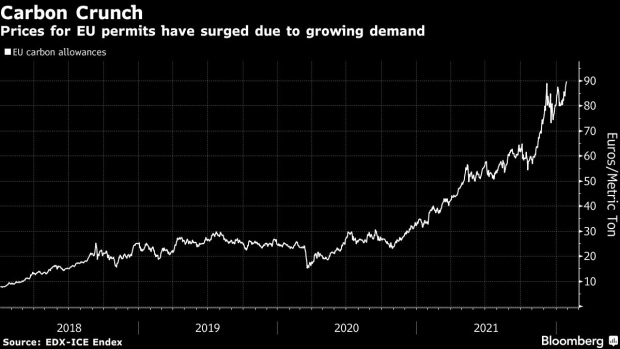Jan 31, 2022
Blame the EU for High Energy Prices, Poland Tells Households
, Bloomberg News

(Bloomberg) -- Consumers reeling from soaring energy prices in Poland this winter are getting a new message from the government in their electric bills: the European Union’s climate policy is responsible for more than half of the power production costs.
Earlier this month, the Polish climate ministry mandated that the nation’s energy providers detail the impact of carbon-emissions costs in invoices to households. While those bills don’t explicitly blame the EU, the cost breakdown suggests that the bloc’s rising prices for carbon are falling on coal-dependent Poland.
There’s also no mention of how the government used billions of euros in EU carbon trading revenues, which go to member states.
“This is manipulation,” said Marcin Kowalczyk, head of the climate team at WWF Poland, an environmental non-governmental organization. “It threatens shifting the public opinion in Poland against the EU and its climate policies.”
The dispute risks exacerbating already fraught relations between Warsaw and Brussels and could complicate talks about the EU’s Green Deal, sweeping climate reforms the bloc is implementing in order to reach carbon neutrality by mid-century. Poland, which is embroiled in a broader dispute with the EU over the rule of law, has argued that it faces increasing expenses to meet the bloc’s climate goals.
Polish officials didn’t immediately respond to a request for comment outside of normal business hours.
Energy Crisis
For much of the last six months, Europe has been in the throes of an energy-supply crisis, with natural gas inventories at historically low levels, sending prices for the fuel surging. That in turn has created greater dependency on other energy sources including coal, driving prices for electricity and carbon permits to record levels.
Meanwhile, the EU has been debating a set of laws to enact the Green Deal, in an effort to clean up every sector from energy to manufacturing, transport and agriculture. As part of it, the bloc agreed to deepen its 2030 emissions-reduction target to at least 55% from 1990 levels.
Critics have tied the recent price increases to the reforms, something EU officials are quick to refute.
“Sadly, mostly for political reasons, some people falsely argue that the increase of gas prices is mainly the result of the European Green Deal, or Commission proposals,” EU climate chief Frans Timmermans said during a meeting of environment and energy ministers on Jan. 21.
“In one member state, even consumers got their energy bill and the energy company wrote on the energy bill ‘the bill is high because of the European plans on the Green Deal,’” he added, an apparent reference to Poland.
Emissions Revenues
The EU carbon market, started in 2005, is the bloc’s key tool to cut pollution. It imposes shrinking emissions caps on nearly 12,000 facilities owned by utilities, manufacturers and airlines and is set to expand into shipping. While a share of carbon permits is given to emitters for free, most are sold at government auctions. Revenues from those sales go to national budgets, with at least half to be used by member states for climate-related purposes.
When the energy-supply crunch struck last year, the European Commission encouraged national governments to use revenues from the emissions-trading system to alleviate the impact on the most vulnerable consumers. Poland hasn’t said how it spent the 25 billion zloty ($6.08 billion) from the auctions of pollution permits last year.
Prime Minister Mateusz Morawiecki has argued power prices are under pressure as Poland faces massive investments to meet EU climate goals. It will cost $415 billion, or about two-thirds of gross domestic product, for the country to reach the bloc’s net-zero emissions goal by 2050, according to government estimates.
The government-designed formula to calculate the share of emissions in energy production costs takes into account the price of carbon and wholesale electricity for this year. Poland relies on coal for more than 70% of power generation and plans to exit the dirtiest fossil fuel entirely by 2049.
Recent comments by the country’s biggest fuel refiner and retailer suggest the actual costs of emissions borne by companies could be lower. Daniel Obajtek, the chief executive of PKN Orlen SA, said his company bought 19 million carbon permits before the energy crisis, at less than a fourth of the current costs, in a move that could now help stabilize the price of gasoline for consumers.
“We are hedged until 2023,” Obajtek told public television channel TVP Info in an interview on Jan. 12. “We had the possibility, together with the government, to lower fuel prices. They are the lowest in Europe.”
©2022 Bloomberg L.P.


